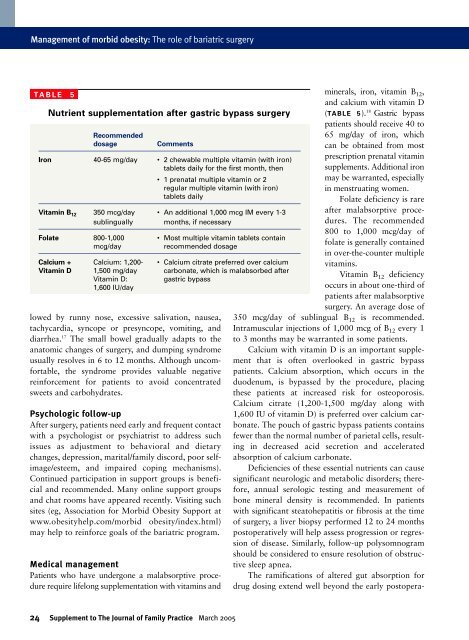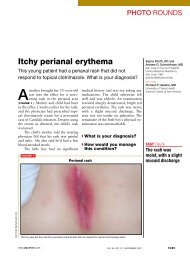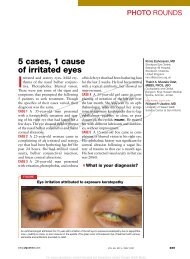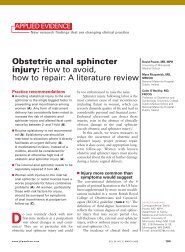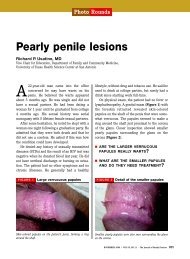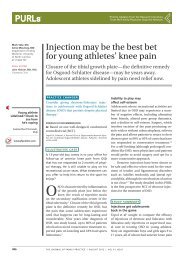Management of morbid obesity - The Journal of Family Practice
Management of morbid obesity - The Journal of Family Practice
Management of morbid obesity - The Journal of Family Practice
You also want an ePaper? Increase the reach of your titles
YUMPU automatically turns print PDFs into web optimized ePapers that Google loves.
<strong>Management</strong> <strong>of</strong> <strong>morbid</strong> <strong>obesity</strong>: <strong>The</strong> role <strong>of</strong> bariatric surgery<br />
TABLE 5<br />
Nutrient supplementation after gastric bypass surgery<br />
Recommended<br />
dosage Comments<br />
Iron 40-65 mg/day • 2 chewable multiple vitamin (with iron)<br />
tablets daily for the first month, then<br />
• 1 prenatal multiple vitamin or 2<br />
regular multiple vitamin (with iron)<br />
tablets daily<br />
Vitamin B 12 350 mcg/day • An additional 1,000 mcg IM every 1-3<br />
sublingually months, if necessary<br />
Folate 800-1,000 • Most multiple vitamin tablets contain<br />
mcg/day recommended dosage<br />
Calcium + Calcium: 1,200- • Calcium citrate preferred over calcium<br />
Vitamin D 1,500 mg/day carbonate, which is malabsorbed after<br />
Vitamin D: gastric bypass<br />
1,600 IU/day<br />
lowed by runny nose, excessive salivation, nausea,<br />
tachycardia, syncope or presyncope, vomiting, and<br />
diarrhea. 17 <strong>The</strong> small bowel gradually adapts to the<br />
anatomic changes <strong>of</strong> surgery, and dumping syndrome<br />
usually resolves in 6 to 12 months. Although uncomfortable,<br />
the syndrome provides valuable negative<br />
reinforcement for patients to avoid concentrated<br />
sweets and carbohydrates.<br />
Psychologic follow-up<br />
After surgery, patients need early and frequent contact<br />
with a psychologist or psychiatrist to address such<br />
issues as adjustment to behavioral and dietary<br />
changes, depression, marital/family discord, poor selfimage/esteem,<br />
and impaired coping mechanisms).<br />
Continued participation in support groups is beneficial<br />
and recommended. Many online support groups<br />
and chat rooms have appeared recently. Visiting such<br />
sites (eg, Association for Morbid Obesity Support at<br />
www.<strong>obesity</strong>help.com/<strong>morbid</strong> <strong>obesity</strong>/index.html)<br />
may help to reinforce goals <strong>of</strong> the bariatric program.<br />
Medical management<br />
Patients who have undergone a malabsorptive procedure<br />
require lifelong supplementation with vitamins and<br />
24 Supplement to <strong>The</strong> <strong>Journal</strong> <strong>of</strong> <strong>Family</strong> <strong>Practice</strong> March 2005<br />
minerals, iron, vitamin B 12,<br />
and calcium with vitamin D<br />
(TABLE 5). 18 Gastric bypass<br />
patients should receive 40 to<br />
65 mg/day <strong>of</strong> iron, which<br />
can be obtained from most<br />
prescription prenatal vitamin<br />
supplements. Additional iron<br />
may be warranted, especially<br />
in menstruating women.<br />
Folate deficiency is rare<br />
after malabsorptive procedures.<br />
<strong>The</strong> recommended<br />
800 to 1,000 mcg/day <strong>of</strong><br />
folate is generally contained<br />
in over-the-counter multiple<br />
vitamins.<br />
Vitamin B 12 deficiency<br />
occurs in about one-third <strong>of</strong><br />
patients after malabsorptive<br />
surgery. An average dose <strong>of</strong><br />
350 mcg/day <strong>of</strong> sublingual B 12 is recommended.<br />
Intramuscular injections <strong>of</strong> 1,000 mcg <strong>of</strong> B 12 every 1<br />
to 3 months may be warranted in some patients.<br />
Calcium with vitamin D is an important supplement<br />
that is <strong>of</strong>ten overlooked in gastric bypass<br />
patients. Calcium absorption, which occurs in the<br />
duodenum, is bypassed by the procedure, placing<br />
these patients at increased risk for osteoporosis.<br />
Calcium citrate (1,200-1,500 mg/day along with<br />
1,600 IU <strong>of</strong> vitamin D) is preferred over calcium carbonate.<br />
<strong>The</strong> pouch <strong>of</strong> gastric bypass patients contains<br />
fewer than the normal number <strong>of</strong> parietal cells, resulting<br />
in decreased acid secretion and accelerated<br />
absorption <strong>of</strong> calcium carbonate.<br />
Deficiencies <strong>of</strong> these essential nutrients can cause<br />
significant neurologic and metabolic disorders; therefore,<br />
annual serologic testing and measurement <strong>of</strong><br />
bone mineral density is recommended. In patients<br />
with significant steatohepatitis or fibrosis at the time<br />
<strong>of</strong> surgery, a liver biopsy performed 12 to 24 months<br />
postoperatively will help assess progression or regression<br />
<strong>of</strong> disease. Similarly, follow-up polysomnogram<br />
should be considered to ensure resolution <strong>of</strong> obstructive<br />
sleep apnea.<br />
<strong>The</strong> ramifications <strong>of</strong> altered gut absorption for<br />
drug dosing extend well beyond the early postopera-


